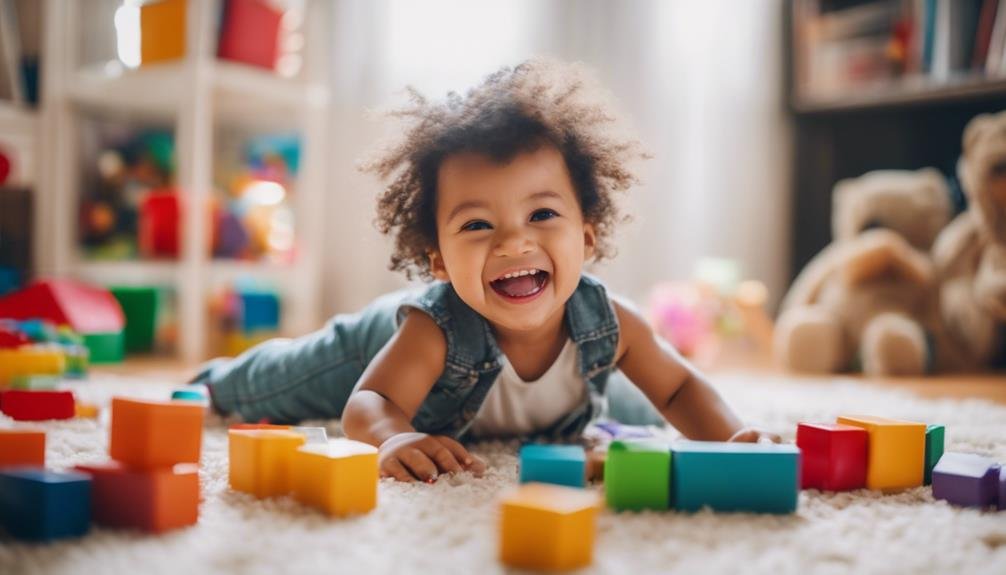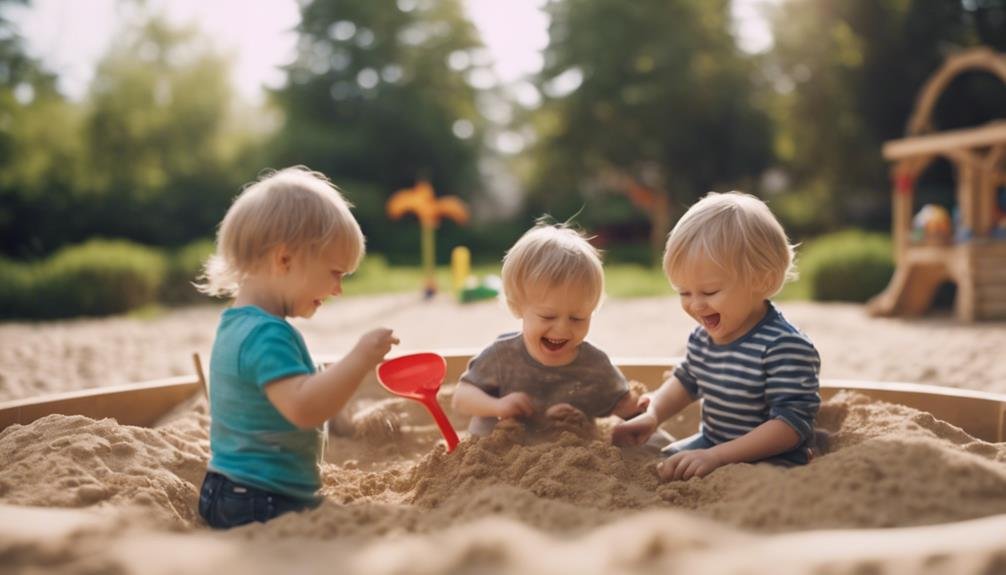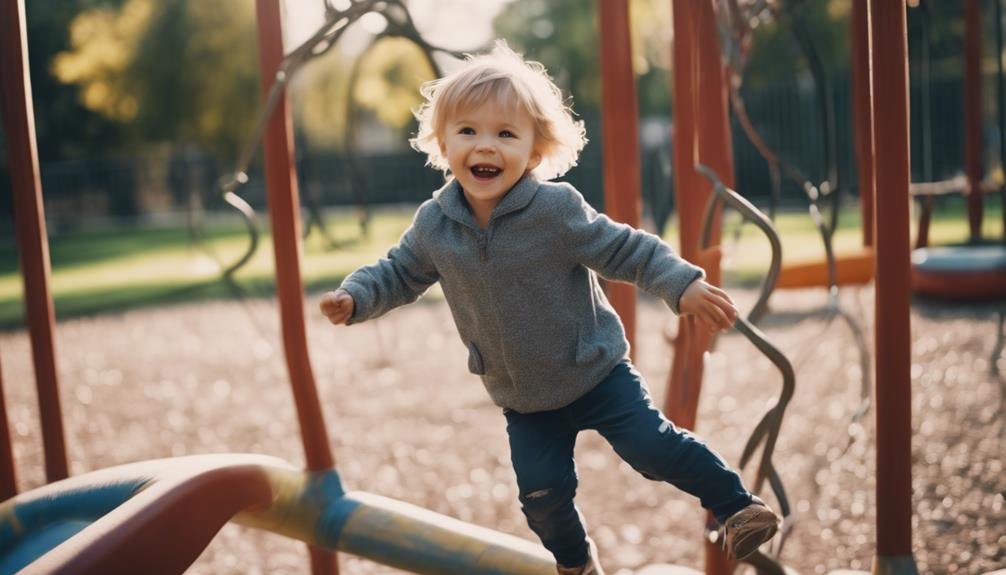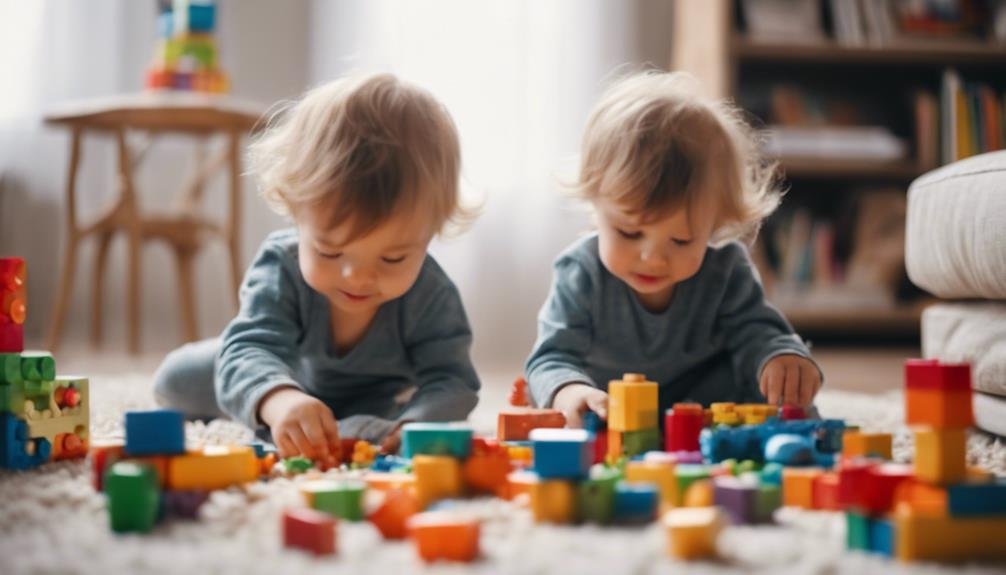"Cherishing Little Steps - A Haven for Baby and Family Journeys"
The Power of Play: How It Drives Toddler Development
You might not realize the profound impact that play has on your toddler's development. The power of play goes beyond mere fun; it plays a pivotal role in shaping your child's cognitive, social, and physical skills. As you witness your little one engage in play, you'll start to observe the intricate ways in which each playful moment contributes to their growth and learning. Stay tuned to discover the fascinating ways in which play influences your toddler's development and sets them on a path towards a bright future.
Key Takeaways
- Play fosters cognitive, social, and physical skills in toddlers.
- It sparks curiosity, creativity, and enhances problem-solving abilities.
- Play develops social skills, empathy, and understanding of others.
- Emotional regulation is learned through play, aiding in expression and control.
- Physical play refines motor skills, coordination, and builds confidence in abilities.
Importance of Play in Toddler Development

Engaging in play activities is crucial for fostering essential cognitive, social, and physical skills in toddlers. Play provides a platform for children to explore the world around them, sparking curiosity and creativity. Through play, toddlers learn to interact with others, developing crucial social skills like sharing, taking turns, and communication. These interactions help build the foundation for future relationships and social behaviors.
Physically, play helps toddlers improve their motor skills, coordination, and balance. Whether they're climbing on a jungle gym, kicking a ball, or stacking blocks, each activity contributes to their physical development. Additionally, play allows toddlers to practice problem-solving and decision-making in a safe and supportive environment. When faced with a challenge during play, children learn to adapt, think critically, and overcome obstacles.
Cognitive Benefits of Play
Playing is essential for toddlers' cognitive development as it enhances their problem-solving skills and critical thinking abilities. When toddlers engage in play, whether it's building blocks, solving puzzles, or engaging in pretend play, they're actively using their brains to make sense of the world around them. Through play, toddlers learn how to think creatively, experiment with different solutions, and make decisions based on their observations. These experiences help strengthen their cognitive abilities and lay the foundation for more advanced thinking skills in the future.
During playtime, toddlers also practice important cognitive functions such as memory, attention, and spatial awareness. For example, when a toddler remembers where a hidden toy is or focuses on completing a puzzle, they're exercising their memory and attention skills. Furthermore, activities like stacking blocks or fitting shapes into corresponding holes help toddlers develop their spatial awareness and understand how objects relate to each other in space. Overall, play serves as a valuable cognitive workout for toddlers, shaping their minds and preparing them for future learning challenges.
Social Skills Development Through Play

As toddlers engage in various play activities that stimulate their cognitive development, they naturally begin to hone their social skills through interactions with others and the environment. Play serves as a crucial platform for toddlers to learn how to communicate, cooperate, and negotiate with their peers. Through activities like pretend play, where they take on different roles and scenarios, toddlers develop their empathy and understanding of others' perspectives. Playdates and group play allow toddlers to practice sharing, taking turns, and resolving conflicts, essential skills for navigating social situations later in life.
Moreover, play provides toddlers with opportunities to observe and mimic social behaviors they witness, helping them understand societal norms and expectations. Whether it's playing house, building blocks together, or engaging in make-believe adventures, toddlers are constantly learning how to interact with others in ways that are respectful and reciprocal. These early social interactions lay the foundation for developing friendships, fostering empathy, and building successful relationships in the future.
Emotional Regulation and Play
Emotions are regulated and managed by toddlers through their play experiences, shaping their understanding of self-control and emotional expression. Play serves as a safe space for toddlers to explore and make sense of their feelings. When engaging in pretend play, such as pretending to be a doctor comforting a patient, toddlers learn to empathize and regulate their emotions accordingly. Through interactions with peers during play, toddlers also practice social skills like sharing, taking turns, and resolving conflicts, which are all crucial aspects of emotional regulation.
Furthermore, play allows toddlers to experiment with different emotions in a controlled environment. For example, they might role-play scenarios that evoke fear, sadness, or joy, helping them learn how to cope with and express these feelings appropriately. By navigating these emotional experiences during play, toddlers develop resilience and a better understanding of their own and others' emotions. In essence, play acts as a powerful tool for toddlers to learn, practice, and refine their emotional regulation skills in a supportive and nurturing setting.
Physical Development and Motor Skills

A key aspect of toddler development lies in the refinement of their physical abilities and motor skills. Through play, toddlers engage in activities that challenge and strengthen their muscles, coordination, and balance. Whether they're crawling through tunnels, stacking blocks, or kicking a ball, each play experience contributes to the development of their gross and fine motor skills.
You may notice your toddler grasping objects more deliberately, taking their first steps independently, or even attempting to jump. These physical milestones are significant markers of their growth and progress. As they engage in play that involves climbing, running, and exploring their environment, they aren't only honing their motor skills but also building confidence in their physical abilities.
Encouraging activities that promote physical development, such as playing with ride-on toys, dancing to music, or practicing hand-eye coordination with simple games, can further enhance your toddler's motor skills. By providing opportunities for active play, you're supporting their overall physical development and laying a strong foundation for future movement and coordination capabilities.
Role of Play in Language Acquisition
Play serves as a vital conduit for toddlers to naturally acquire language skills and expand their communication abilities. Through playful interactions, children engage in language-rich environments that foster the development of vocabulary, grammar, and social communication skills. When toddlers engage in pretend play, they often engage in conversations, negotiate roles, and create narratives, all of which contribute to their language acquisition. Additionally, games like peek-a-boo or singing nursery rhymes not only provide opportunities for language exposure but also help toddlers learn about turn-taking, gestures, and intonation patterns crucial for effective communication.
Observing children at play reveals how they experiment with words, mimic sounds, and practice using language in various contexts. Playful activities such as storytelling, playing with puppets, or engaging in make-believe scenarios all enhance language development by encouraging toddlers to express themselves creatively. These experiences not only build their vocabulary but also help them understand the nuances of language, such as humor, emotions, and storytelling techniques. In essence, play acts as a dynamic platform for toddlers to explore, practice, and refine their language skills in a natural and enjoyable manner.
Encouraging Playful Learning Environments

Creating an environment that fosters playful learning is essential for maximizing toddlers' developmental potential and enhancing their cognitive abilities. By incorporating elements like colorful toys, interactive games, and engaging activities, you can stimulate your child's curiosity and creativity. Setting up a designated play area with age-appropriate toys and materials can encourage exploration and experimentation. Consider rotating toys regularly to maintain your toddler's interest and introduce new learning opportunities.
Additionally, incorporating sensory experiences such as textured objects, musical instruments, and different scents can help enhance your child's sensory development. Providing opportunities for social interaction through playdates or group activities can also promote important social skills like sharing, turn-taking, and communication.
Frequently Asked Questions
Can Play Activities Hinder a Toddler's Development?
Play activities can enhance a toddler's development by fostering creativity, problem-solving skills, and social interactions. However, excessive screen time or lack of varied play experiences may potentially hinder their overall growth and learning potential.
What Role Does Imagination Play in Toddler Development?
Imagine a world where anything is possible, a realm where a stick transforms into a sword or a cardboard box becomes a spaceship. Imagination in toddler development fosters creativity, problem-solving skills, and emotional intelligence.
Are There Specific Types of Play That Are More Beneficial?
When it comes to the types of play that benefit toddlers most, activities like pretend play, building with blocks, and engaging in interactive games can enhance cognitive, social, and emotional skills, fostering holistic development.
How Can Playtime Be Integrated Into Daily Routines?
Like adding sprinkles to a cupcake, weave play into your day for toddlers. Integrate play into routines by incorporating games during transitions, setting up play stations, and scheduling outdoor adventures.
Is There a Difference in Play Impact Based on Gender?
There can be variations in play impact based on gender. Boys and girls may gravitate towards different types of play, influencing their development in unique ways. Understanding these differences can help tailor play experiences to support overall growth.
Conclusion
You've learned about the significant impact of play on toddler development, from enhancing cognitive skills to fostering social interactions.
Did you know that 70% of a child's brain development occurs in the first three years of life through play?
By providing a rich play environment, you're setting the stage for lifelong learning and growth. Keep encouraging play and watch as your toddler thrives in all areas of development.



I was just as impressed as you were. Your sketch is beautiful and your written content is excellent. Nevertheless, you may be worried that you will be doing something contentious going forward. I concur that you will fix this quickly.
Шелом, товарищи геймеры! Хочу поделиться эмоциями что касается крайней игрушке, на которую погрузился. Это впечатляюще супер! Графика, сюжет, геймплей – [url=http://www.businessforum.kz/]казино[/url] все на высшем уровне.
The level of my admiration for your work matches your own. Your sketch is aesthetically pleasing and your authored content is impressive. Nonetheless, you appear to be concerned that you may be heading in a direction that causes some unease. I concur that you will be able to address this quickly and get back on track.
I share your level of enthusiasm for the work you’ve produced. The sketch you’ve displayed is refined, and the material you’ve authored is impressive. Nevertheless, you seem anxious about the prospect of heading in a direction that could cause unease. I agree that you’ll be able to address this concern in a timely manner.